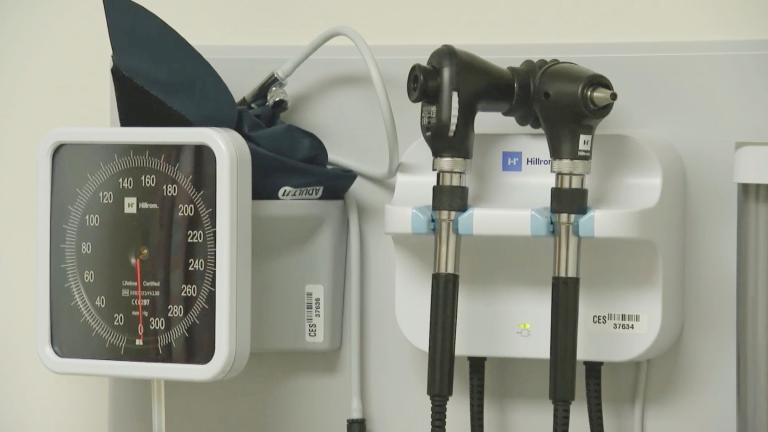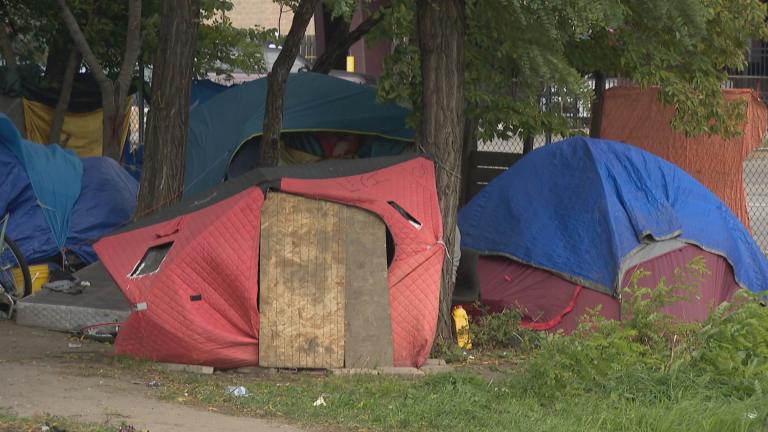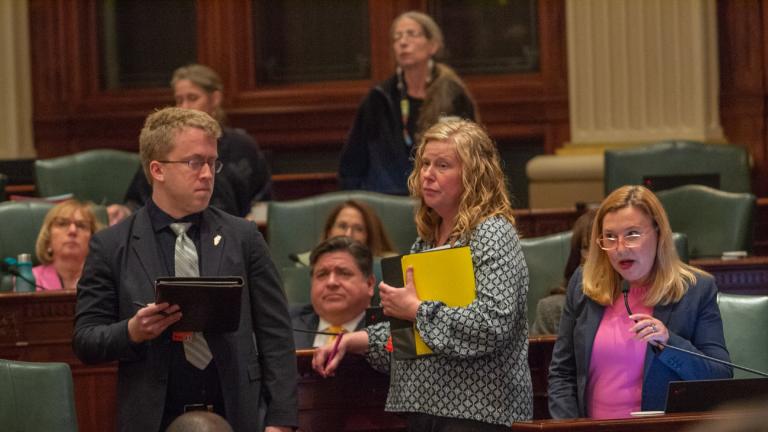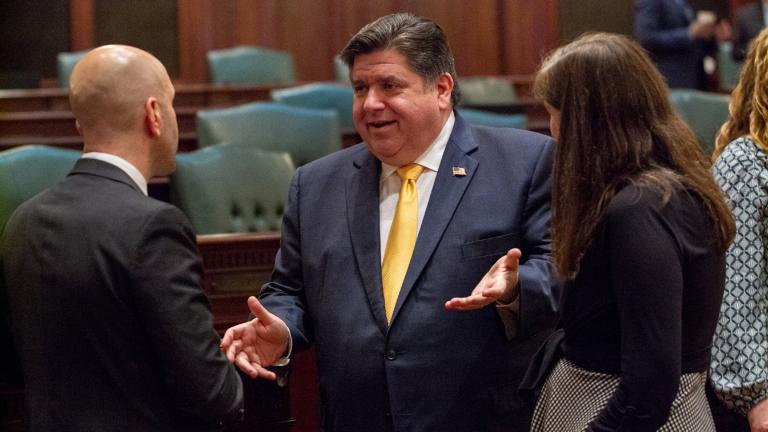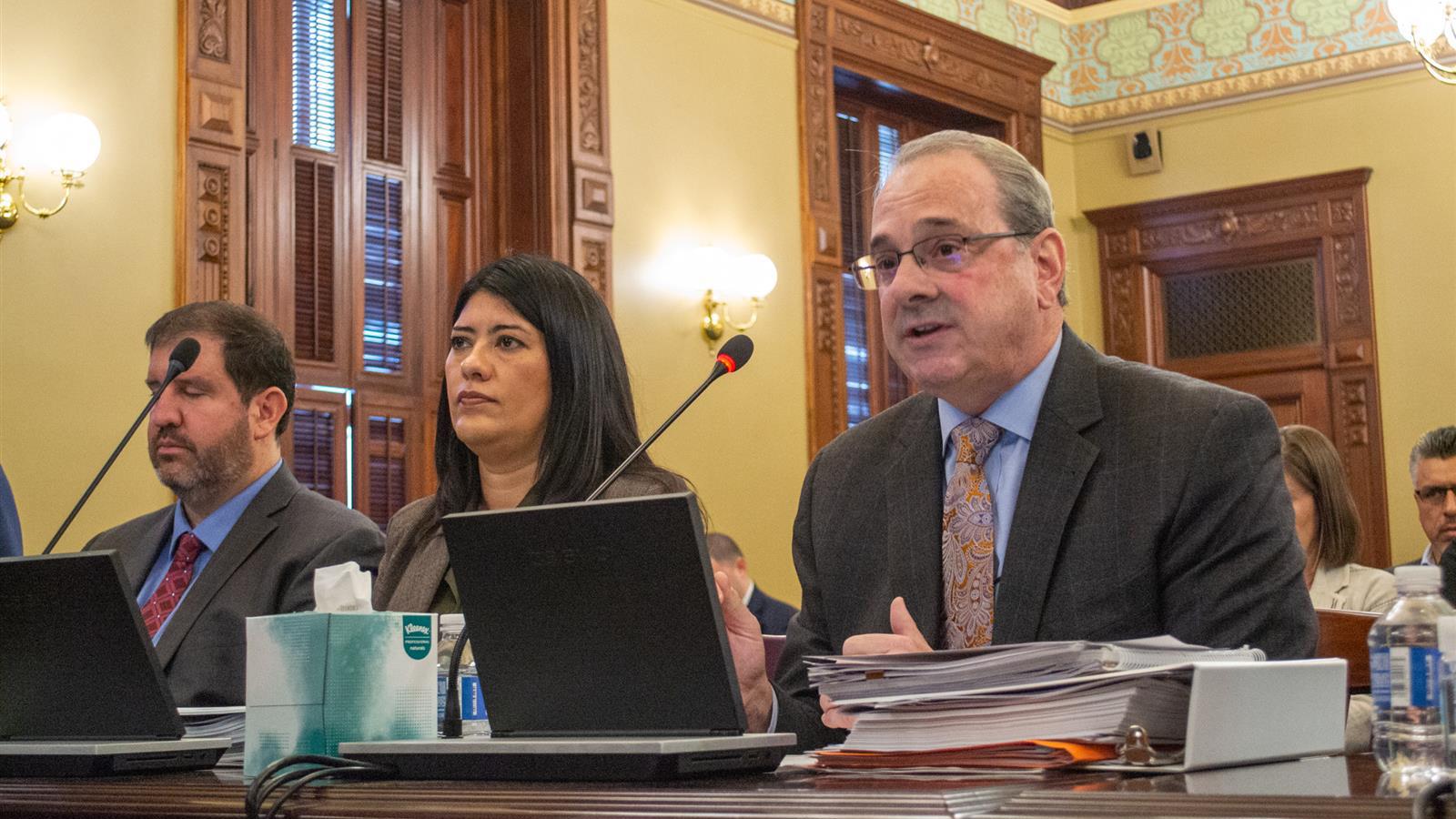 Ray Marchiori, acting director of the Illinois Department of Employment Security, testifies before the Legislative Audit Commission on Nov. 7, 2023, about the agency’s handling of unemployment claims during the COVID-19 pandemic. (Jerry Nowicki / Capitol News Illinois)
Ray Marchiori, acting director of the Illinois Department of Employment Security, testifies before the Legislative Audit Commission on Nov. 7, 2023, about the agency’s handling of unemployment claims during the COVID-19 pandemic. (Jerry Nowicki / Capitol News Illinois)
SPRINGFIELD – Illinois received another credit upgrade Tuesday, the same day a legislative committee once again scrutinized Gov. J.B. Pritzker’s administration for its handling of unemployment claims during the COVID-19 pandemic.
The upgrade came from Fitch Ratings, the last remaining holdout of the nation’s three major credit reporting agencies to advance the state’s status to “A” grade. Collectively, Fitch, S&P Global Ratings and Moody’s Investors Service have given the state nine credit upgrades since 2021.
Credit upgrades generally make it cheaper for the state to borrow money, playing a major role in investors’ assessment of risk in buying state bonds. Fitch moved Illinois to an A-, up from the BBB+ rating it had given the state last year. Illinois’ ratings had been on a general downward trajectory across administrations of both parties since the mild recession two decades ago.
Fitch’s review of state finances drew similar conclusions to those that came before it: reserves are growing while long-term liabilities, including pension debt, remain “an elevated but still moderate burden.”
“Reserves have improved to historically high levels for the state and provide an important fiscal cushion, but levels remain relatively modest versus other states,” Fitch said in its analysis. “Management has eliminated many outstanding budgetary liabilities and established a sustainable pattern of smoother fiscal decision-making.”
The state’s “rainy day” fund – officially referred to as the Budget Stabilization Fund – had a balance of nearly $2 billion as of Tuesday.
Still, the state’s unfunded pension liabilities sit at roughly $140 billion – a number representing what the state would owe if every pensioner sought to collect benefits at once. While an indicator of the pension funds’ financial health, it does not reflect their current ability to pay out benefits that are owed.
In recent years, lawmakers have allocated hundreds of millions of dollars beyond statutory requirements to Illinois’ pension funds, lessening future liabilities. Fitch called those payments “helpful, but insufficient to address this structural budget gap.”
It also warned the rating could once again be lowered if Illinois returns to a point of “irresolute and contentious fiscal decision-making” which had become commonplace over several recent administrations, especially during the two years the state went without a budget between 2015 and 2017.
“We are continuing to right the past fiscal wrongs in our state with disciplined fiscal leadership, and credit rating agencies and businesses alike are taking notice of Illinois’ remarkable progress,” Pritzker said in a statement.
The upgrade was issued, Fitch noted, because Illinois is planning on issuing bonds next week to continue financing a pension buyout program that’s anticipated to shave $1.4 billion off the state’s pension liability over its lifetime.
Also in recent years, Illinois has reduced its “backlog” of unpaid bills to within a 30-day accounts payable cycle. That effort was boosted by an $898 million allocation to pay off old group health insurance bills last year, which passed as part of a broader plan to pay down debt accrued by the unemployment insurance trust fund during the COVID-19 pandemic.
The unemployment fund was about $4.5 billion in the red at its lowest point, but lawmakers approved multiple cash infusions to pay off the debt to avoid further massive tax hikes on employers.
IDES Scrutinized
The nature of that unemployment trust fund debt was the subject of scrutiny at an unrelated committee hearing Tuesday.
The Legislative Audit Commission, a bipartisan bicameral group that reviews state audits, questioned Ray Marchiori, the acting director of the Department of Employment Security who previously served as the agency’s chief of staff before Pritzker appointed him director in January.
The committee was discussing a state auditor general report from July which showed Illinois overpaid unemployment benefits to the tune of $5.2 billion during the first 18 months of the COVID-19 pandemic. Much of it went to fraudulent claimants, including hundreds of dead or incarcerated individuals.
During the pandemic, IDES’ phone lines and website couldn’t handle the sudden spike of individuals trying to file for benefits. State officials scrambled to contract with outside entities to both increase staff and stand up a new federally funded program for people traditionally ineligible for unemployment insurance. That program, called Pandemic Unemployment Assistance, was designed to give benefits to people such as gig workers and freelancers, and was the subject of about $3.2 billion of the overpayments.
The audit found the rush created weaknesses that fraudsters would go on to exploit when the state temporarily halted its process of crossmatching claims against five other databases to verify eligibility.
The audit noted that Illinois failed to follow federal recommendations in May 2020 to prevent some of the fraud. It wasn’t until September 2021 that IDES implemented the use of a multi-state crossmatching tool called the Integrity Data Hub, according to the audit.
At many points, the commission hearing served as a venue for lawmakers to air long-stated grievances.
Rep. Fred Crespo, D-Hoffman Estates, criticized what he viewed as the agency’s “total disregard for the General Assembly” during the pandemic, citing IDES’ unwillingness to share call center data.
But much of the questioning for IDES on Tuesday centered on whether it was ready to respond to future crisis events, potentially driven by global political strife.
“Are you prepared right now for the world to go to hell again, or will you be prepared in a couple more months?” Sen. Craig Wilcox, R-McHenry, asked the department. “What is your – when are you ready to say you can handle the next relatively foreseen crisis in the state?”
Marchiori responded that IDES “scaled up” its server capacity and other information technology capabilities to handle pandemic high-water marks of claims. He said IDES is averaging 1,800-2,000 claims per day in “normal times,” but the systems can handle at least 48,000 per day.
IDES has also created an internal fraud task force and is working on other controls, he said, which will be helped by $30 million in federal grants.
Good Financial News
While Wilcox quizzed IDES on its readiness for another economic downturn, a recent report from the legislature’s Commission on Government Forecasting and Accountability painted a positive picture for state finances one-third of the way through the current fiscal year.
Thus far in fiscal year 2024, which began in July, state base revenues are $742 million ahead of the same period last year, which ended in the state netting $50.7 billion in revenue. While it marked good financial news, COGFA has frequently noted that the latter months of the fiscal year – especially April when tax returns come in – can often make or break state finances. Read more: State ends fiscal year with record $50.7 billion in base revenue, sparking small surplus
The economy, meanwhile, “appears to be humming along,” according to COGFA’s Chief Economist Benjamin Varner, especially in areas such as consumer spending.
While Varner noted some economic forecasters “are expecting a slowing of the economy” – potentially related to high interest rates, the threat of a government shut-down, the resumption of the repayment of student loans, and global political strife – such predictions are not new in recent years.
“However, economic slowdowns have been forecasted consistently over the past two years because of similar impediments, yet the economy continues to expand,” he wrote. “The question continues to be how long can these potential economic hurdles be avoided before a major slowdown occurs.”
Capitol News Illinois’ Hannah Meisel contributed.
Capitol News Illinois is a nonprofit, nonpartisan news service covering state government. It is distributed to hundreds of newspapers, radio and TV stations statewide. It is funded primarily by the Illinois Press Foundation and the Robert R. McCormick Foundation, along with major contributions from the Illinois Broadcasters Foundation and Southern Illinois Editorial Association.

